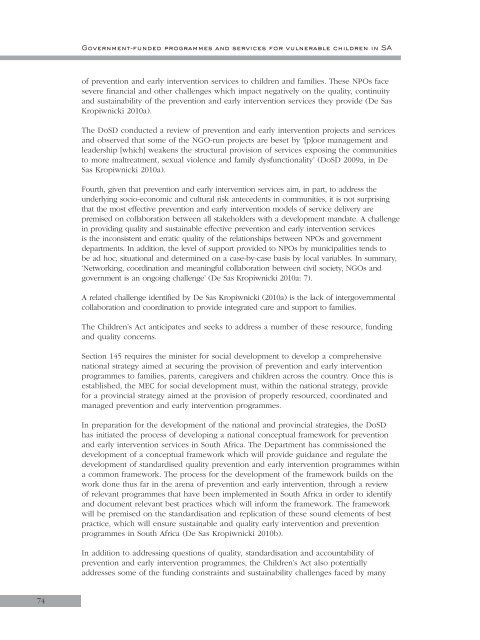Government-funded programmes and services for vulnerable - Unicef
Government-funded programmes and services for vulnerable - Unicef
Government-funded programmes and services for vulnerable - Unicef
You also want an ePaper? Increase the reach of your titles
YUMPU automatically turns print PDFs into web optimized ePapers that Google loves.
<strong>Government</strong>-<strong>funded</strong> <strong>programmes</strong> <strong>and</strong> <strong>services</strong> <strong>for</strong> <strong>vulnerable</strong> children in SA<br />
of prevention <strong>and</strong> early intervention <strong>services</strong> to children <strong>and</strong> families. These NPOs face<br />
severe financial <strong>and</strong> other challenges which impact negatively on the quality, continuity<br />
<strong>and</strong> sustainability of the prevention <strong>and</strong> early intervention <strong>services</strong> they provide (De Sas<br />
Kropiwnicki 2010a).<br />
The DoSD conducted a review of prevention <strong>and</strong> early intervention projects <strong>and</strong> <strong>services</strong><br />
<strong>and</strong> observed that some of the NGO-run projects are beset by ‘[p]oor management <strong>and</strong><br />
leadership [which] weakens the structural provision of <strong>services</strong> exposing the communities<br />
to more maltreatment, sexual violence <strong>and</strong> family dysfunctionality’ (DoSD 2009a, in De<br />
Sas Kropiwnicki 2010a).<br />
Fourth, given that prevention <strong>and</strong> early intervention <strong>services</strong> aim, in part, to address the<br />
underlying socio-economic <strong>and</strong> cultural risk antecedents in communities, it is not surprising<br />
that the most effective prevention <strong>and</strong> early intervention models of service delivery are<br />
premised on collaboration between all stakeholders with a development m<strong>and</strong>ate. A challenge<br />
in providing quality <strong>and</strong> sustainable effective prevention <strong>and</strong> early intervention <strong>services</strong><br />
is the inconsistent <strong>and</strong> erratic quality of the relationships between NPOs <strong>and</strong> government<br />
departments. In addition, the level of support provided to NPOs by municipalities tends to<br />
be ad hoc, situational <strong>and</strong> determined on a case-by-case basis by local variables. In summary,<br />
‘Networking, coordination <strong>and</strong> meaningful collaboration between civil society, NGOs <strong>and</strong><br />
government is an ongoing challenge’ (De Sas Kropiwnicki 2010a: 7).<br />
A related challenge identified by De Sas Kropiwnicki (2010a) is the lack of intergovernmental<br />
collaboration <strong>and</strong> coordination to provide integrated care <strong>and</strong> support to families.<br />
The Children’s Act anticipates <strong>and</strong> seeks to address a number of these resource, funding<br />
<strong>and</strong> quality concerns.<br />
Section 145 requires the minister <strong>for</strong> social development to develop a comprehensive<br />
national strategy aimed at securing the provision of prevention <strong>and</strong> early intervention<br />
<strong>programmes</strong> to families, parents, caregivers <strong>and</strong> children across the country. Once this is<br />
established, the MEC <strong>for</strong> social development must, within the national strategy, provide<br />
<strong>for</strong> a provincial strategy aimed at the provision of properly resourced, coordinated <strong>and</strong><br />
managed prevention <strong>and</strong> early intervention <strong>programmes</strong>.<br />
In preparation <strong>for</strong> the development of the national <strong>and</strong> provincial strategies, the DoSD<br />
has initiated the process of developing a national conceptual framework <strong>for</strong> prevention<br />
<strong>and</strong> early intervention <strong>services</strong> in South Africa. The Department has commissioned the<br />
development of a conceptual framework which will provide guidance <strong>and</strong> regulate the<br />
development of st<strong>and</strong>ardised quality prevention <strong>and</strong> early intervention <strong>programmes</strong> within<br />
a common framework. The process <strong>for</strong> the development of the framework builds on the<br />
work done thus far in the arena of prevention <strong>and</strong> early intervention, through a review<br />
of relevant <strong>programmes</strong> that have been implemented in South Africa in order to identify<br />
<strong>and</strong> document relevant best practices which will in<strong>for</strong>m the framework. The framework<br />
will be premised on the st<strong>and</strong>ardisation <strong>and</strong> replication of these sound elements of best<br />
practice, which will ensure sustainable <strong>and</strong> quality early intervention <strong>and</strong> prevention<br />
<strong>programmes</strong> in South Africa (De Sas Kropiwnicki 2010b).<br />
In addition to addressing questions of quality, st<strong>and</strong>ardisation <strong>and</strong> accountability of<br />
prevention <strong>and</strong> early intervention <strong>programmes</strong>, the Children’s Act also potentially<br />
addresses some of the funding constraints <strong>and</strong> sustainability challenges faced by many<br />
74
















